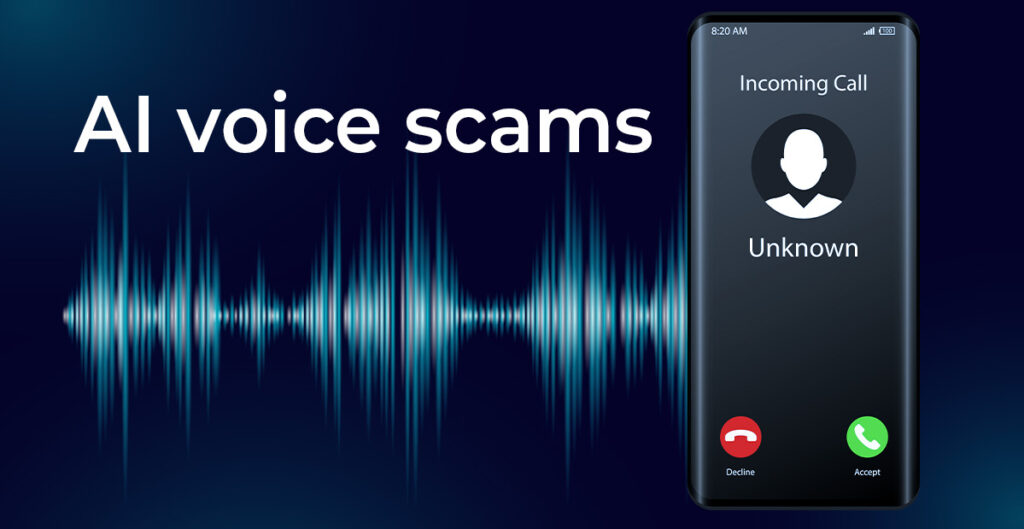How to respond to AI voice scams
I read a post on Facebook this morning warning me of the risk of my voice being collected for an AI voice scam. The post said that a woman answered a call from an unknown number, and the person on the other end seemed to intentionally be asking a yes or no question. The conversation went something like this:
Q: “Can you hear me?”
A: “Uh…I can hear you.”
Q: “Can you hear me?”
A: “I said I can hear you.”
Q: “I just need a yes or no answer.”
The woman did not give the possible scammer the answer that they were looking for. It’s possible the caller could have recorded any part of the phone call and repurposed anything said, using artificial intelligence most likely, to create a fake voice recording.
This is just the collection portion of an AI voice scam. AI voice scams are sophisticated attacks made by criminals on both ends. They use AI to create a voice recording that sounds like an identifiable individual and then use that recording to steal money or information.
The caller could use this recording to access bank accounts, credit card accounts, or other sensitive personal information. They could even use the recording to target someone known to the person who answered the call. You may have heard of the “grandparent scam,” where a grandchild’s voice is faked and used to demand money.
If businesses are implementing AI chatbots and using artificial intelligence for all sorts of tasks from hiring to making appointments, then criminals and scammers are increasingly using AI as well. It’s important to be aware of signs that you’re being targeted by an AI voice scam before it’s too late.
There is something to be learned by considering what we can do to prevent being a target of a voice scam.
Don’t underestimate opting out
There are ways to prevent your phone number from being too easily available online. In addition to not posting your phone number on any LinkedIn or similar profile, it’s simple to sign up for the National Do Not Call Register, and registrations do not expire. You can also ask harvesting companies like ZoomInfo to delete your information, which I did just recently.
Don’t answer the phone
This may be because I’m a millennial, but I have a policy of not answering phone calls from unknown numbers. Scammers can make their phone number look like it comes from your hometown or look like a phone number you recognize.

Android users can enable “Block Calls From Unidentified Callers” through the phone icon on the home screen, then navigating to settings and blocked numbers. Apple users can find the same feature through Settings and Phone to turn on “Silence Unknown Callers.” If you use WhatsApp, also they just launched this for the app.
Don’t provide the answer the scammer is looking for
A simple “yes” or “no” answer may seem innocuous, but my voice saying “yes” or “no” could answer a question like:
Is this Lizzy Hill?
Is your address correct?
Is this your phone number?
Imagine that the scam collecting call went differently, and, with a little more information about me, they record me saying my name, my phone number, or my address. That information could get someone into my personal accounts.
If you do answer the phone, you should be confident in your ability to think on your feet and outsmart the scammer. The woman who answered the actual call described previously caught on quickly, and the person on the other end made it obvious what they were looking for. In other words, she got lucky.
Outsmarting the person on the other end of the call may work for now, but it won’t work forever. Scammers are getting smarter every day. This person is likely still out there targeting people, and they now know what not to say.
Don’t think that you can outsmart AI
Even if AI can’t take “I can hear you” and make a convincing fake recording right now, it probably will be able to soon. Artificial intelligence is constantly learning, even from the smartest humans, and we are no match for what it will one day be able to do.
AI has been top of mind for Privacy Ref for some time—we recently held a webinar on AI and privacy risk, a recording of which is available here.
Reach out to Privacy Ref with all your organizational privacy concerns, email us at info@privacyref.com or call us 1-888-470-1528. If you are looking to master your privacy skills, check out our training schedule, register today and get trained by the top attended IAPP Official Training Partner.